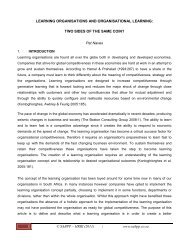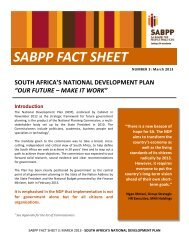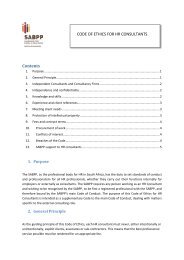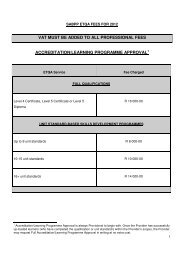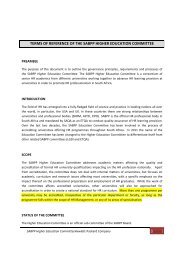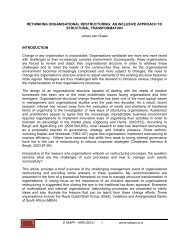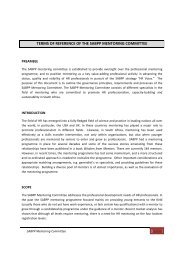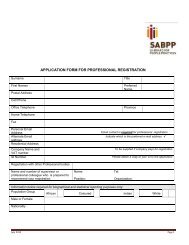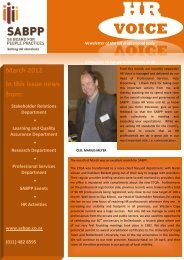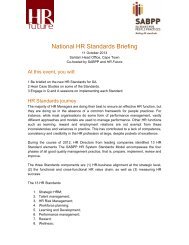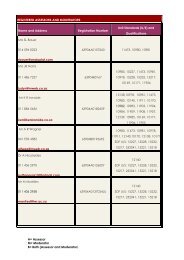CURRICULUM VITAE - SABPP
CURRICULUM VITAE - SABPP
CURRICULUM VITAE - SABPP
Create successful ePaper yourself
Turn your PDF publications into a flip-book with our unique Google optimized e-Paper software.
Organisation Description of Duties<br />
Participating as a subject matter expert in the Quality Council for Trades and Occupations (QCTO) pilot project to develop the<br />
curriculum framework for Occupational Trainers (i.e. Technical Trainers/Instructors)<br />
<strong>SABPP</strong><br />
� Working Group 1 – developing the occupational profile (for the OFO)<br />
� Working Group 2 – learning process design including the knowledge component, practical skills component and the<br />
(Project Manager)<br />
workplace experience component.<br />
� Motivating for the <strong>SABPP</strong> to become the Assessment Quality Partner (AQP) for the Occupational Trainer qualification;<br />
coordinating and participating in the AQP work; planning to pilot the qualification in the MERSETA and Mining domains.<br />
Gauteng Dept. of<br />
Economic Development<br />
(Project Manager)<br />
DPLG / Local Govt.SETA<br />
(QA)<br />
GTZ (now GIZ)<br />
(QA)<br />
FirstRand Corporate<br />
Centre (FR CC)<br />
Trident Steel (Aveng<br />
Group)<br />
Local Economic Development (LED) Municipal Capacity Building Diagnostic, Planning, Monitoring and Evaluation -<br />
the overall objective of the project was to undertake a comprehensive assessment of operational and institutional capacity needs of<br />
municipal LED units in the province of Gauteng as the basis for the formulation of an LED Capacity Building Plan. Key components of<br />
the project were:<br />
� Skills audit (individual and institutional capacity) to identify capacity needs and constraints;<br />
� Analysis of municipal economic development capacity support available from Gauteng Provincial Government sector<br />
departments.<br />
� Identification of appropriate and accredited private institutions and organisations supplying capacity building services.<br />
� Investigation of available capacity building financing mechanisms.<br />
� Identification of the roles and responsibilities of key stakeholders in supplying municipal economic development capacity<br />
support.<br />
� Development of detailed guidelines for the implementation of a process to monitor and evaluate capacity building exercises.<br />
(As a member of a project team) developing a comprehensive set of training material and allied resources for Local Economic<br />
Development learnerships at NQF Levels 5 and 6, including Assessment Guides, Portfolios of Evidence, Learnership Logbooks and<br />
Workplace Coach Guidelines – my contribution was the HR modules for each level plus all the supporting documentation (Assessment<br />
Guides etc.) for every module in both levels.<br />
(Part of a project team) Building the capacity of Integrated Development Planning (IDP) Trainers, including a mentoring and coaching<br />
phase, where the IDP Trainers are co-facilitators – my contribution was planning, conducting and reporting on a comprehensive training<br />
needs analysis (of IDP Trainers), designing and developing the mentoring and coaching phase and finalising the Project Report.<br />
Following on from a comprehensive Skills Assessment/Analysis for Group Internal Audit (GIA) in 2011, the Head: Learning and Talent<br />
Management, Human Capital Division requested a Skills Assessment/Analysis in the remaining Business Units (± 12) that make up<br />
the FR CC, consisting of approximately 645 employees. Recently, a new Competency Library was introduced for the Corporate Centre<br />
and this must form the basis of the Skills Assessment/Analysis. However, it has still been necessary to ensure that every Role Profile is<br />
properly aligned to the Competency Library, before designing and developing the Skills Assessment Questionnaires<br />
Skills Audit/Talent Assessment: Approximately 1800 employees; Eight Phases – Identification of Jobs and Job Requirements;<br />
Preparation of Data Collection Tools; Accessing Employees; Pilot Study; Obtaining Relevant Information; Capturing Information into<br />
Database; Analysing the Database; Final Report and Presentation<br />
6



